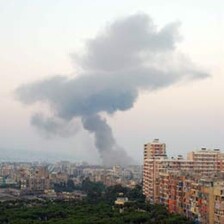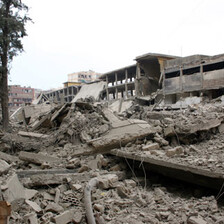Beirut 17 July 2006

The aftermath of attacks by Israel on Lebanon 17 July 2006. (Peter Speetjens/IRIN)
The weekend is over, and now it is time to get back to the work-a-day routine - but wait, normal time and routine will not return this Monday like it did a week ago. The day started with some loud bombs, and during the last 10 minutes, we have heard another series of earth-shaking explosions. It has been a tense day in Beirut.
Timor Gocksel, the Turkish man who directed the UN mission in southern Lebanon (UNIFIL) for almost 30 years, gave a talk on the American University of Beirut (AUB) campus to try to put the current war into the larger context. Some of you might have seen part of this - CBS taped the whole thing. Like many people here, he is angry with both Hezbollah and the Israelis. He thinks there is a good chance this will be over in a few days because world opinion will not put up with this brutality.
There is so much that is not being reported. Israeli leaders are saying that the reason they are bombing the port of Beirut and the Damascus highway is to stop the delivery of weapons from Syria. Gocksel found this amusing: “Do you think they are going to come via the Damascus road or the ports where they will have to pay import duty when there are hundreds of unguarded roads between Syria and Lebanon?” The practical problem is that Hezbollah has fired only a tiny fraction of their available rockets; they have spread the others out all over the mountains of southern Lebanon. Hezbollah (like Hamas) has developed like a resistant bacteria - the more Israel has pounded them with their superior weaponry, they more they have begun to resemble a swarm of bees, impossible to shoot down. Israeli leaders are well aware of this, so they actually are punishing the innocent Lebanese to coerce - terrorize - them into confronting Hezbollah. It seems that we have terrorists on both sides.
Meanwhile, many foreigners have been finding ways out of Lebanon. American students at AUB will be given first priority tomorrow; the Embassy says it won’t announce until the last minute if by land, sea or helicopter. Others will apparently have the opportunity as early as tomorrow, and most likely within the next three days. It is interesting what causes tension among people in situations like this. They have been told they can only have one small bag. The dilemma is like the subject of a high school essay - what would you bring if you had a few hours to pack and could only fill one small bag? There was a great deal of discussion about going or not going. Can one make a deliberate, rational decision under these circumstances? Do you weigh your interests against your emotions? Is reducing risk worth leaving a life behind? For some, the decision seems obvious; for others, it is tormenting.
In some parts of Lebanon, there are already severe shortages of food and fuel. AUB has only fuel for 12 days; then people start dying in the hospital. In Saida, the largest supermarket closed when its shelves became bare. Despite the bombing, Beirut is swarming with displaced people - from the south and from the southern suburbs. There is very little happening in the streets, no protests against those attacking us, not even a shaking of fists in the air - our attackers might as well be the Martian ships that struck Earth in War of the Worlds. They fire at us from distant ships, and from high-flying, speeding jets. “A screaming comes across the sky …” Israelis are hearing a screaming too. The missiles’ rainbow arc - unlike the rainbow that God placed in the sky after the Deluge as a sign of peace between heaven and earth, is an emblem of murderous disjuncture. The bustling soundtrack of Beirut has been muted; now there is mostly an uncannily quiet, punctuated by intermittent deafening percussion. It almost makes you wish for the normal routine Monday.
Related Links
Patrick McGreevy heads up the American Studies Program at the American University of Beirut





